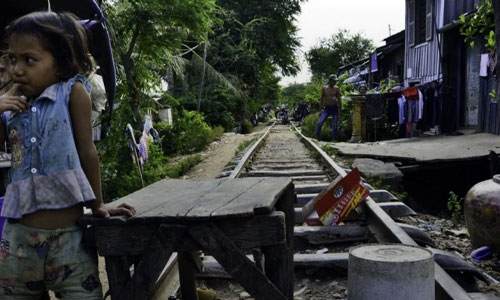Resettlement must be treated not as a logistical necessity, but as a profound development obligation—one where human outcomes are measured not in kilometers of rail laid, but in lives rebuilt with dignity.
— Cambodia —
empower. restore. protect.










Restoring Tracks, Restoring Trust: Addressing Debt Fallout from Cambodia’s Railway Resettlement
"Infrastructure development must not come at the cost of human dignity; safeguards must evolve to ensure that progress does not push the most vulnerable further behind."
— Final Report, TA-7934: Cambodia Railway Rehabilitation Review (ADB, 2013)
Challenge
The Cambodian Railway Rehabilitation Project, funded jointly by the Asian Development Bank (ADB) and AusAID, aimed to reconnect vital transport corridors linking Phnom Penh, Poipet, Sisophon, and Sihanoukville, as part of the Greater Mekong Subregion's regional railway initiative. Valued at USD 143 million, the project included a Public-Private Partnership (PPP) component involving Toll Holdings of Australia.
However, to enable rail track renewal, more than 4,000 households living along disused rail corridors were identified for resettlement, with over 1,000 families requiring full relocation. This introduced serious social risks, most notably involuntary displacement, loss of livelihood, and a surge in household debt.
The key challenge was the unintended escalation of indebtedness among the resettled households, driven by:
- Misinterpretation of the land plots provided as collateral, prompting borrowing against perceived security;
- Access to high-interest informal loans from unregulated money lenders;
- Lack of financial literacy and viable income sources post-relocation;
- Failure to predict behavioral consequences of resettlement incentives, such as the option-to-own land after 5 years.
By late 2012, debt per resettled family had multiplied over sevenfold, and over 60% of relocated households had fallen into debt—up from only 18% before resettlement.
Strategy
The ADB commissioned Jim Swander, an experienced financial sector advisor, supported by international lawyer Shaan Stevens, to lead a 6-month diagnostic mission (Dec 2012–June 2013) under Technical Assistance TA-7934-CAM. The goal was twofold:
- Assess the financial condition of resettled households and analyze the root causes of debt accumulation;
- Propose pragmatic, enforceable strategies to resolve existing indebtedness and prevent similar crises in future infrastructure resettlement projects.
Their multi-pronged approach included:
- Desktop review of ADB, AusAID, and NGO documents;
- Site visits and interviews across Phnom Penh, Poipet, Battambang, and Sihanoukville;
- Stakeholder consultations with government officials, NGOs, microfinance institutions (MFIs), and affected households;
- Use of debt sample data to analyze patterns in household borrowing and income levels;
- Comparative insights from other Asia-Pacific resettlement projects.
The team identified four contributory risk categories:
- Poorly predicted consequences of deferred land title offers;
- Predatory lending by unlicensed money lenders;
- Low financial capability among households;
- Gaps in policy design vs. ground-level implementation.
They proposed a two-stage response
- Short-term debt intervention, including refinancing, interest write-offs, and use of Self-Help Groups (SHGs) under the Expanded Income Restoration Program (EIRP).
- Long-term structural safeguards, including:
- Preventing land plots from being used as collateral;
- Enhancing financial education;
- Delivering pre-constructed housing instead of cash compensation;
- Legislative and institutional reform to regulate informal lending.
Transformation
The final report delivered in June 2013 offered practical, culturally aware and financially viable strategies to restore trust with the resettled communities and prevent future harm. Key recommendations included:
- Immediate refinancing of unsustainable loans via regulated MFIs or EIRP-aligned SHGs;
- Exploring partial interest forgiveness mechanisms while avoiding moral hazard
- Fettering land titles from being used as collateral for the first 5 years;
- Integrating financial literacy programs and community development infrastructure in all future resettlement packages
This work contributed directly to improved safeguard frameworks within ADB and AusAID-financed infrastructure, and helped shift future policy toward resettlement as a development opportunity rather than a humanitarian liability.